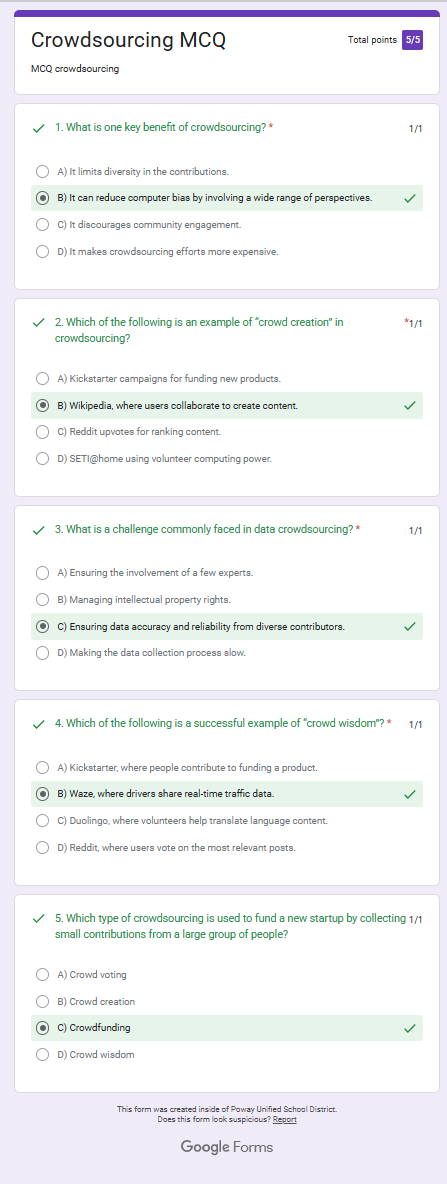Crowdsourcing
Definition:
A method of collecting help, ideas, or input from a large group of people, usually online.
Types of Crowdsourcing
- Crowdfunding: Raising money by collecting small contributions from large groups.
- Crowd Creation: Gathering creative input from a crowd, often for content generation or design.
- Crowd Voting: Collecting public opinion or feedback to make decisions.
- Crowd Wisdom: Using collective intelligence for decision-making or problem-solving.
Popcorn Hack 1
What are the different types of crowdsourcing, and how do they contribute to innovation?
Crowdsourcing is a way to get a bunch of people involved in something, and it helps bring new ideas to life in different ways. Crowdfunding is when people pitch in small amounts of money to help fund a project, which is great for startups or indie creators who don’t have big investors. Crowd creation is all about getting creative input from lots of people—like asking a community to help design a logo or come up with ideas for a game. Crowd voting lets people have a say in decisions by giving feedback, like voting for their favorite new product or helping decide what features an app should have. And crowd wisdom is when a group’s collective knowledge is used to solve problems or make smarter choices, like predicting trends or improving a product.
Data Crowdsourcing
- Definition: Data from large groups of people.
- Open Source Development: Building software open to the public.
- Public Datasets: Data open to the public to use.
Popcorn Hack 2
What is data crowdsourcing, and how does it contribute to open-source development?
Data crowdsourcing is when a bunch of people contribute data to build large datasets that are public and anyone can use. It contributes to open-source development because it gives researchers and developers access to tons of information without having to collect it all themselves. This helps with things like training AI, tracking environmental changes, and improving tech.
Examples:
- Google Open Images – A dataset with millions of labeled images that help train computer vision models.
- NASA Earth Observations (NEO) – Collects satellite data on things like climate and natural disasters.
- Kaggle Datasets – A platform where people share all kinds of data for machine learning projects.
Distributed Crowdsourcing
- Definition: A system of multiple computers working together to complete a task.
- How it works: Systems share resources, such as processing power, storage, and data, to achieve a common goal.
Popcorn Hack 3
How does distributed computing contribute to innovations through crowdsourcing?
Having multiple systems of computers helps innovation by being able to gather a wider range of data that has more variety, which is more useful for people around the world to use. Some examples would be reviews on Amazon and GitHub, where users can provide public data for other users to use.
Homework Hack
The Impact of Crowdsourcing on Modern Innovation
Crowdsourcing has become a game-changer for modern innovation by allowing large groups of people to contribute ideas, funds, and data to solve problems faster and more efficiently. Different types of crowdsourcing, like crowdfunding for raising money, crowd creation for generating content, crowd voting for gathering opinions, and crowd wisdom for making smart decisions, have helped businesses, researchers, and creators bring new ideas to life. Distributed computing takes crowdsourcing to the next level by using the power of many computers to tackle huge tasks, like analyzing space signals or researching diseases. Meanwhile, data crowdsourcing has fueled open-source development, with projects like Google Open Images and NASA Earth Observations providing valuable datasets for AI, science, and technology.
The future potential of crowdsourcing would be expanding the diversity in who contributes to databases by getting internet access and modernization to underdeveloped countries so they have the opportunity to build off and contribute to crowdsourcing.
Completed MCQ:
